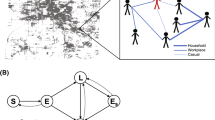Abstract
To investigate how an infectious disease spreads, it is most desirable to discover the underlying disease transmission networks based on surveillance data. Existing studies have provided some methods for inferring information diffusion networks, where nodes correspond to individual persons. However, in the case of disease transmission, to effectively develop intervention strategies, it would be more realistic and reasonable for policy makers to study the diffusion patterns at the metapopulation level, that is, to consider disease transmission networks where nodes represent subpopulations, and links indicate their interrelationships. Such networks are useful to: (i) investigate hidden factors that influence epidemic dynamics, (ii) reveal possible sources of epidemic outbreaks, and (iii) practically develop and improve strategies for disease control. Therefore, based on such a real-world motivation, we aim to address the problem of inferring disease transmission networks at the metapopulation level. Specifically, we propose an inference method called NetEpi (Network Epidemic), and evaluate the method by utilizing synthetic and real-world datasets. The experiments show that NetEpi can recover most of the ground-truth disease transmission networks based only on the surveillance data. Moreover, it can help detect and interpret patterns and transmission pathways from the real-world data.
Access this chapter
Tax calculation will be finalised at checkout
Purchases are for personal use only
Preview
Unable to display preview. Download preview PDF.
Similar content being viewed by others
References
Keeling, M.J., Eames, K.T.: Networks and Epidemic Models. J. R. Soc. Interface. 2, 295–307 (2005)
Bajardi, P., Poletto, C., Ramasco, J.J., Tizzoni, M., Colizza, V., Vespignani, A.: Human Mobility Networks, Travel Restrictions, and Global Spread of 2009 H1N1 Pandemic. PLoS ONE 6, e16591 (2011)
Gomez-Rodriguez, M., Leskovec, J., Krause, A.: Inferring Networks of Diffusion and Influence. In: 16th ACM SIGKDD International Conference on Knowledge Discovery and Data Mining, pp. 1019–1028. ACM Press, New York (2010)
Myers, S., Leskovec, J.: On the Convexity of Latent Social Network Inference. In: Advances in Neural Information Processing Systems, pp. 1741–1749 (2010)
Teunis, P., Heijne, J.C.M., Sukhrie, F., van Eijkeren, J., Koopmans, M., Kretzschmar, M.: Infectious Disease Transmission as a Forensic Problem: Who Infected Whom? J. R. Soc. Interface 10(81) (2013)
Arino, J.: Diseases in Metapopulations. In: Ma, Z., Zhou, Y., Wu, J. (eds.) Modeling and Dynamics of Infectious Diseases. Series in Contemporary Applied Mathematics, vol. 11, pp. 65–123. World Scientific (2009)
Ndeffo, M.M.L., Gilligan, C.A.: Resource Allocation for Epidemic Control in Metapopulations. PLoS ONE 6, e24577 (2011)
Shang, C.S., Fang, C.T., Liu, C.M., Wen, T.H., Tsai, K.H., King, C.C.: The Role of Imported Cases and Favorable Meterorological Conditions in the Onset of Dengue Epidemics. PLoS Negl. Trop. Dis. 4, e775 (2010)
Yuan, Y., Li, C.T., Windraw, O.: Directed Partial Correlation: Inferring Large-Scale Gene Regulatory Network through Induced Topology Disruptions. PLoS ONE 6, e16835 (2011)
Lasserre, J., Chung, H.R., Vingron, M.: Finding Associations among Histone Modifications Using Sparse Partial Correlation Networks. PLoS Comput. Biol. 9, e1003168 (2013)
David, P.W., Bhaskar, D.R.: Sparse Bayesian learning for basis selection. IEEE Trans. Signal Processing. 52(8), 2153–2164 (2004)
Tipping, M.E., Faul, A.: Fast Marginal Likelihood Maximization for Sparse Bayesian Models. In: 9th International Workshop on Artificial Intelligence and Statistics, pp. 3–6 (2003)
Tzikas, D., Likas, C., Galatsanos, N.: Sparse Bayesian Modeling with Adaptive Kernel Learning. IEEE Trans. Neural Networks. 20(6), 926–937 (2009)
Leskovec, J., Faloutsos, C.: Scalable Modeling of Real Graphs using Kronecker Multiplication. In: 24th International Conference on Machine Learning, pp. 497–504. ACM Press, New York (2007)
Brasil, P., de Pina Costa, A., Pedro, R., da Silveira Bressan, C., da Silva, S., Tauil, P., Daniel-Ribeiro, C.: Unexpectedly Long Incubation Period of Plasmodium vivax Malaria, in the Absence of Chemoprophylaxis, in Patients Diagnosed outside the Transmission Area in Brazil. Malar. J. 10(1), 122 (2011)
Author information
Authors and Affiliations
Editor information
Editors and Affiliations
Rights and permissions
Copyright information
© 2014 Springer International Publishing Switzerland
About this paper
Cite this paper
Yang, X., Liu, J., Cheung, W.K.W., Zhou, XN. (2014). Inferring Metapopulation Based Disease Transmission Networks. In: Tseng, V.S., Ho, T.B., Zhou, ZH., Chen, A.L.P., Kao, HY. (eds) Advances in Knowledge Discovery and Data Mining. PAKDD 2014. Lecture Notes in Computer Science(), vol 8444. Springer, Cham. https://doi.org/10.1007/978-3-319-06605-9_32
Download citation
DOI: https://doi.org/10.1007/978-3-319-06605-9_32
Publisher Name: Springer, Cham
Print ISBN: 978-3-319-06604-2
Online ISBN: 978-3-319-06605-9
eBook Packages: Computer ScienceComputer Science (R0)





